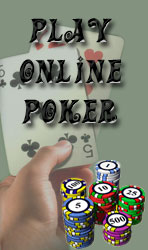Pokerwiner.com → Lessons of poker
RAISING TO GET A FREE CARD
As we just noted, when your semi-bluff raise is called, it may have allowed you the opportunity to get a free card on the next round.
However, when you’re thinking of raising specifically to get a free card, you should keep in mind two considerations – your position and the cost of the raise.
To get a free card, you must be late to act; if you are not last and you check, you will have shown weakness. A player behind you with a better hand than yours will probably bet, denying you the chance for a free card.
In holdem, you can always be sure of your position since it’s fixed throughout a hand, but in games like
seven card stud and razz, you often have no guarantee you will be last to act from on e round to the next.
In seven stud, for instance, the player to your left may have a king high to start the betting but on the next card the player to your right or you yourself catch an ace.
Now you must lead off, which you certainly do not want to do if you’re still banking on a free card. So if you have some doubt about securing last position on the next round, raising to get a free card can just cost you money needlessly when it turns out you’re not last all.
Which bring up the second consideration when you’re thinking of raising to get a free card namely, that that free card is not free at all.
It costs you the price of your raise. So unless you have other reasons for raisons for raising, you would make the play only when the cost of the raise now is cheaper than what you’d have to pay for a call on the next round.
In a $10-$20 holdem game, for example, in which the bet doubles on fourth street, you might raise $10 after the flop to avoid paying $20 to call a bet on the next round.
Of course, you need not take advantage of the free card option. You certainly wouldn’t when you catch the card that makes your hand. Nor would you when you catch a card that looks as if it makes your hand.
For example, the holder of the pair of black 7s with Q ![]() J
J ![]() 9
9 ![]() showing, a hand we discussed in the preceding two chapters, probably knew he had the worst hand and might have taken a free card in the hope of making a flush, but he found it much more profitable to continue the semi-bluff and bet after the 9
showing, a hand we discussed in the preceding two chapters, probably knew he had the worst hand and might have taken a free card in the hope of making a flush, but he found it much more profitable to continue the semi-bluff and bet after the 9 ![]() hit, since only an opponent with a very strong hand could risk a call.
hit, since only an opponent with a very strong hand could risk a call.
RAISING TO GAIN INFORMATION
Raising simply to gain information is a tricky play and shouldn’t be done often. Generally you should consider any information gained as an extra benefit of raise you are making for other reasons.
There are occasions, though, when you cost yourself less by raising to gain information early than you would if you had not led your opponent into giving his hand away.
These occasions usually occur in heads-up situations and only in early betting rounds. Furthermore, your opponent should be the type of player whose response to your raise is likely to reflect the hand he is holding.
Otherwise your raise could very well give you wrong information.
What can you learn by raising? Well, if your opponent calls, he probably has a good hand. If he reraises, he probably has a very good hand. (It’s for this reason you cannot raise to gain information when your opponent is the sort of player who is capable of a semi-bluff reraise.)
If your opponent folds, that, of course, tells you he’s weak, and you take down the money. An added benefit to raising to gain information is that sometimes your opponent may fold marginal hands that he shouldn’t have folded.
You invest in an early raise to gain information in order to save yourself money later. If, for example, you call on fourth street in seven stud, you may continue to call three more bets only to discover in the showdown that you didn’t have a chance from the beginning.
But a raise on fourth street followed by a call or a reraise from your opponent allows you to play your hand knowing you’re up against considerable strength.
Depending upon your own strength, you can then decide whether and how long it’s worth continuing in the hand.
Let’s say with a pair of kings on fourth street in seven card stud you raise an open pair of 9s. Your opponent reraises. You decide that opponent has three 9s and fold.
By risking one bet (your raise), you save as many as three bets you might otherwise have called on fifth street, six street, and on the end. Your savings is even greater when the bet doubles after fourth street. A trial-balloon raise on a $10 round could save you three $20 calls later.
Nevertheless, raising just to gain information is tricky. For example, if that open pair of 9s just calls your raise, can you be sure the opponent doesn’t have three 9s? What to do on the next round may still not be clear to you.
That is why you should generally reserve your raises for other purpose an consider whatever information you gain from your opponent’s responses as an added benefit.



